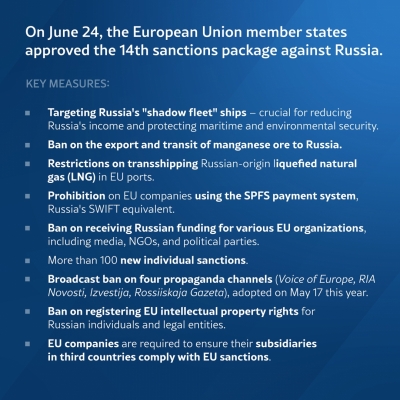On 24 June 2024, the Minister of Foreign Affairs, Baiba Braže, took part in the meeting of the Foreign Affairs Council of the European Union in Luxembourg, EU Foreign Affairs Ministers took decisions on approval of sanctions against Russia as well as discussing future support to Ukraine in its fight against the Russian aggression, as well as the situation in the Middle East, the Western Balkans, Georgia, and the Great Lakes region.
“Significant progress has been made with restricting Russia’s capabilities, ensured by an increased military and other support to Ukraine as well as by the 14th round of EU sanctions on Russia approved today and the use of windfall profits from immobilised Russian assets for the purchase of military equipment for Ukraine. The sanctions package contains vital decisions, including a ban on exports and transit of manganese ore to Russia and targeting of the Russian “shadow fleet” vessels. The new round of sanctions against Russia is in the security interests of the EU as a whole,” the Latvian Foreign Minister underlined.
At the same time, Minister Baiba Braže called on those present not to stop at that, urging them to continue work on measures restricting Russia, which includes countering hybrid attacks and getting started on devising yet another round of sanctions. The minister stressed in particular that “sanctions should immediately be strengthened on Belarus to prevent the circumvention, through that country, of sanctions imposed on Russia”. Looking back at the Ukraine Peace Summit held in Switzerland, the Latvian Foreign Minister called for achieving a global political will in support of Ukraine’s peace plan.
The Ukrainian Minister of Foreign Affairs, Dmytro Kuleba, underlined at the opening of the ministerial discussion that support for Ukraine remains crucial. Accordingly, EU Foreign Ministers exchanged opinions on channelling windfall profits from immobilised Russian assets towards strengthening Ukraine’s military capabilities and restoration of infrastructure. Ministers also highlighted the need to agree in the near future on a framework document on the EU’s commitments in support of Ukraine. Minister Baiba Braže said she was pleased that increasingly more EU Member States supported Ukraine’s attacks on military targets on Russian soil.
The EU Foreign Affairs Council discussed the development of the situation in the Middle East and, in particular, the need to find a long-term solution and address the severe humanitarian crisis.
The Council followed up on the EU Foreign Ministers’ discussion of 27 May about a future dialogue with Georgia. Baiba Braže emphasised that “the adoption of the Law on Transparency of Foreign Influence and the targeting of civil society diverts Georgia from its goal of joining the EU and is incompatible with the status of an EU candidate country. EU support for Georgian civil society is now of particular importance. Further steps taken by the Georgian Government will be decisive in the future dialogue with the EU.”
The Member States expressed their interest in strengthening a dialogue with the Western Balkans region, which plays an important role in ensuring European security and stability, including in preventing illegal migration.





